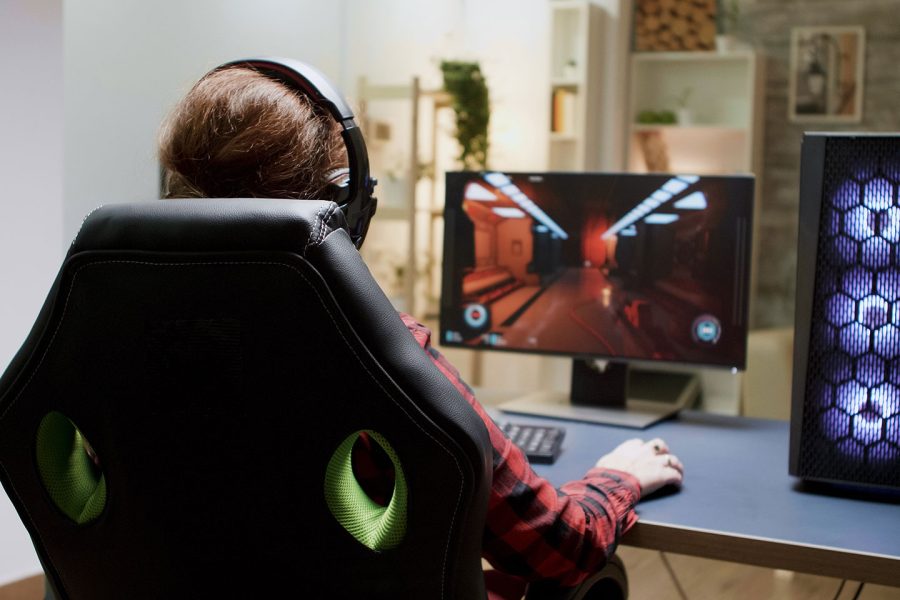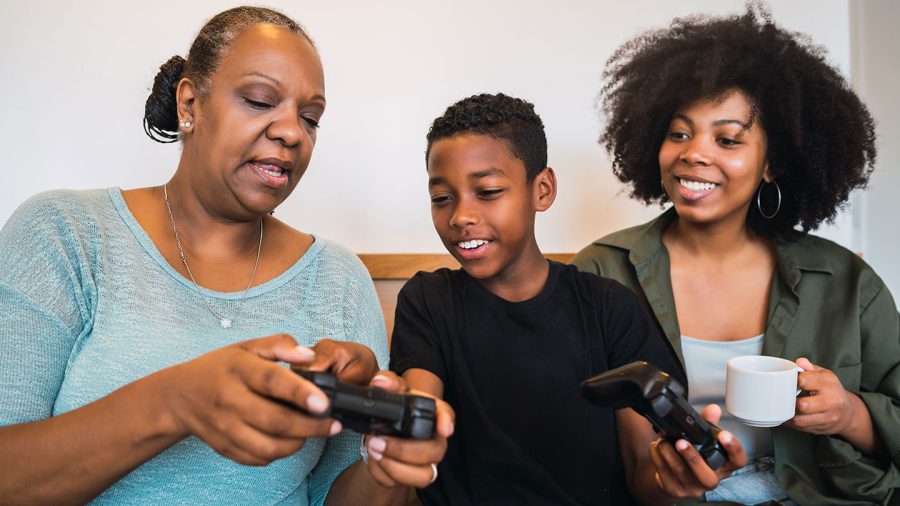Can Teens Learn From Video Games
What should I know about video games and kids?
Sections in this Guide
- Fourth dimension spent playing
- Types of games
- Ratings
- Livestreaming
- Violent video games
- Cyberbullying
- Educational gaming
- Health
- Addiction
- Tips
past Kristelle Lavallee Collins and Jill R. Kavanaugh

How many hours a day do kids play video games?
Video games are a pop form of entertainment for youth, from toddlers to immature adults. According to several contempo studies near young children and tweens and teens, young people spend the following corporeality of time gaming in a typical mean solar day:
- Toddlers (under the historic period of 2) spend minimal time playing whatsoever type of reckoner, console, or mobile games.
- Preschoolers (ages 2 to 4) spend 5 minutes per day playing reckoner or console games, and ten minutes playing mobile games.
- Young children (ages five to 8) spend 19 minutes per day playing calculator or console games, and 21 minutes playing mobile games.
- Tweens (ages 8 to 12) spend 55 minutes per day playing computer or console games, and 34 minutes playing mobile games.
- Teens ages 13 to eighteen spend 69 minutes per day playing computer or console games, and 27 minutes playing mobile games.
Remember, the above reflects how much time the average child and teen plays video games–not how much time they should be spending gaming. When thinking about your own child'south gaming information technology is important to consider where they are in their development, what types of game(due south) they are playing, and what other activities fill up their day.
In determining how much fourth dimension your child can healthfully spend playing video games, it can be helpful to remember of your child's 24-hr day. Sketch out the hours they will spend sleeping, eating (including having 1 device-free family meal), at school, doing homework, being outside, existence physically active, and spending time with friends and family unit. Once both you and your kid know what time they have that is free, y'all tin can assistance them plan how much of their costless fourth dimension they'd like to spend playing video games.
What are some types of video games that kids play?
In that location are many unlike ways to play video games, including:
- Console gaming, such as the PlayStation 5, Xbox Serial X and Series S, or Nintendo Switch
- Handheld video gaming, such as the Nintendo 3DS or Nintendo Switch Lite
- Computer gaming, played on a desktop estimator or laptop, either as a downloaded game, in a web browser, or through a service similar Steam
- Mobile gaming, such every bit those played on a smartphone or tablet via an app
- Virtual Reality (VR) gaming, including the HTC Vive and Meta/Oculus headsets
- Augmented Reality (AR) gaming, which can be played on a variety of devices
Regardless of the platform, many games have an online component, in which the game is played either partially or entirely online against other players. There are a vast number of unlike types of video game genres (and many games fit into several categories), but a few popular genres include:
- Get-go-person shooters (Counter Strike: Global Offensive, Phone call of Duty)
- Battle royale games (Fortnite, PUBG, Noon Legends)
- Role-playing games (The Witcher iii: Wild Hunt, Path of Exile)
- Multiplayer online battle loonshit (Dota ii, League of Legends: Wild Rift)
- Action-adventure (Grand Theft Auto V)
- Social simulation games (Fauna Crossing, The Sims)
Statistics show that video games are popular, merely why practise kids enjoy these games then much? Motivations backside video gaming vary depending on the child or teen, but research shows that video games allow youth to escape their issues, to endeavor on dissimilar personalities, to socialize, and to appoint in challenging and reward-based experiences.
How are video games rated?
In North America, every game has a rating set by the Entertainment Software Rating Board (ESRB), and in Europe the Pan European Game Data (PGEI) age rating organisation aims to help parents make informed decisions when information technology comes to their child's gaming. While these ratings can be helpful, it is always all-time to read reviews of a game, and watch your child or teen play, in order to get a better agreement of the content and if it is optimal for your kid.
What is livestreaming?
Many gamers broadcast their gameplay to a public audience (known as livestreaming) using online services similar YouTube or Twitch, and many children and teens (and adults) lookout these gamers.
Why does my kid want to watch other people play video games?
Children and teens want to watch others play video games for a diversity of reasons, including:
- Social: They tin collaborate with others, and in some cases strengthen their relationships with friends and family unit members who are besides watching or livestreaming themselves. Livestreams can also provide a sense of community as viewers feel equally though they are role of a gaming experience. In addition, they might picket considering of the attractiveness or popularity of specific streamers or the involvement in item games or genres.
- Learning: They are able to acquire new skills, tips, moves, and other information from watching others' gameplay. Viewers are also able to follow their favorite gaming or esports tournaments and stay-upwards-to-date with the latest gaming news.
- Entertainment: They enjoy the experience of watching others livestream in a manner that is like to watching live streams on social media.
- Escape: They utilize watching livestreams as a way to release tension and (temporarily) escape from bug.
Something to consider is that livestreaming is just that–a live event, and so your kid may be exposed to inappropriate content such as inappropriate language, sexualized content, or violence. While non common, teens who livestream also run the hazard of being a target of cyberbullying, stalking, or swatting, putting your entire family at hazard.
What practise I need to know about vehement video games and kids?
Many parents wonder if violent video games can brand their children or teens aggressive or trigger-happy. Unfortunately, there is no easy answer to this question, every bit violence is a complex issue. While research in the surface area of violence is ongoing, researchers have spent a lot of time studying how violent video games affect children and teens. Show shows that playing fierce video games has the potential to increase aggression, and the American Psychological Association recommends that children, parents, and teachers educate themselves most how vehement video games can lead to ambitious behavior in youth. Parents should know that aggression tin include increased angry or hostile feelings as well as reduced empathy for others (meaning that children might be less likely to help others in distress). Some children can get desensitized if they are continually exposed to violence in video games. Researchers are continuing to study how tearing video games touch wellness and beliefs.
Can cyberbullying happen in online gaming?
Many online games allow the player to collaborate with others via text or voice chat. These features are often unmoderated, and your child may be exposed to threats, offensive language, or other objectionable content–they may even participate in bullying others. Female gamers in particular are oftentimes targets of sexual harassment. Unfortunately, many children and teens think that cyberbullying and aggression, such every bit insulting others and arguing via text or voice chat, are a mutual function of online gaming culture. Research shows that amid college-aged students, factors that place gamers more at risk of experiencing cyberbullying include being male, playing trigger-happy online games, and spending more time gaming.
Are video games educational?
What is the connectedness between video games and wellness?

Video games tin can contribute to the overall health and wellbeing of children and teens. Parents and caregivers should be aware of the following:
Concrete wellness
- Sleep: Video gaming before bed can contribute to a variety of slumber problems, including poor quality sleep and not enough sleep.
- Obesity: Research looking into the human relationship betwixt playing video games and weight gain as well as obesity has found mixed results. There is evidence that advergames can promote unhealthy eating habits, video game playing can contribute to increased calorie consumption, and younger children who play video games may have a college BMI in their teens.
- Physical activity: Exergames are a blazon of video game that require players to collaborate physically with the game. Exergames are available in virtual reality, mobile, computer, and console formats. Exergaming tin can be an enjoyable way to encourage physical activity, reduce obesity, and ameliorate residual, agility, and speed.
- Motor skills: Playing video games tin help better motor functioning, including spatial skills, such as knowing where objects are in relation to others, and motor skills, such as those needed for driving.
Social health
- Prosocial behaviors: Children tin can learn prosocial behaviors, such as helping, sharing, and cooperating, past playing video games that include social activity (for case, interacting with video game characters equally opposed to a puzzle game). Youth can also increment their ability to cooperate, share, and maintain positive relationships with others outside of gaming.
- Connectedness and community: Players who appoint in multiplayer online video games experience lower loneliness and social feet, equally these games encourage social interaction often in the form of cooperation and/or competition.
Mental health
- Feet: Children and teens who struggle with Problematic Interactive Media Use in the form of video game playing may be more probable to develop anxiety. On the other hand, research besides shows that video games may help reduce anxiety in youth.
- Low: Youth who already feel depressive symptoms have a higher chance of developing Internet Gaming Disorder, while some video game playing has the potential to alleviate depression and anxiety.
- Gambling behaviors: Some video games offer boodle boxes, which are virtual, in-game items that players can purchase with real-world coin without knowing what the box contains. These virtual items could help a histrion level-up or change the look of their avatar. Many adolescents play games that offering loot boxes, and mobile games aimed at younger children frequently take loot boxes every bit well. Adolescents buy loot boxes for various reasons, including increasing their competitive edge in video games, gaining specific items or characters, enjoying opening the boxes, changing the appearance of their avatar, believing that loot boxes are of loftier value, and earning coin. Adolescents who spend money on loot boxes are more likely to feel gambling issues.
- Attention-deficit/hyperactivity disorder: Adolescents tin can experience more intense symptoms of ADHD when playing video games, and children who have ADHD may be more likely to develop Problematic Interactive Media Use. Specialized video games used by clinicians tin besides assistance assess and treat ADHD.
Can my child be fond to video games?
Digital Health Tips

To help your child use video games in a healthy way, consider the following tips:
- Set up boundaries. It is easy to become involved in a game and play for hours at a time, just children benefit from a diversity of activities. Agree on a certain amount of fourth dimension to play games and suggest other activities they might enjoy.
- Do your homework. Remember, the content of what your kids play is just equally important as the amount of time they spend playing. When your children ask you for a new game, do your homework before yous agree to buy it. Learn almost the game'southward ESRB rating, read reviews, and even play the game first before you allow your kids to play. If the game isn't appropriate for their age or doesn't match your value organisation, find an alternative game.
- Go along video game systems out of your children's bedrooms. By keeping gaming systems (including mobile devices) in family areas, you lot can see how, and how often, they are being used. You can also more easily keep track of time limits. Studies show that children with electronic media in their bedrooms are more likely to be overweight and take sleep bug.
- Review and monitor interactive and online features. Many games can be livestreamed and/or are multiplayer in nature, allowing your kid to chat or share content with other players who they may not know in real life. Be sure to gear up up these accounts with your kids and allow them know that you have their passwords should they ever demand help. Discuss the importance of interim respectfully and maintaining privacy in these online environments with your teen, and consider disabling these features entirely for younger children.
- Get in a social event. Video games are fun and challenging for adults too! Parents can spend time with their youth past having a family gaming nighttime (just brand certain that the games are appropriate for anybody involved).
- Discuss in-game purchases ahead of time. Help your child or teen empathise that in-game purchases are costly, and ready limits on whether they can or cannot brand these types of purchases. Parents can also consider restricting or disabling these features.
Can Teens Learn From Video Games,
Source: https://digitalwellnesslab.org/parents/video-games/
Posted by: hartmanfesion.blogspot.com


0 Response to "Can Teens Learn From Video Games"
Post a Comment